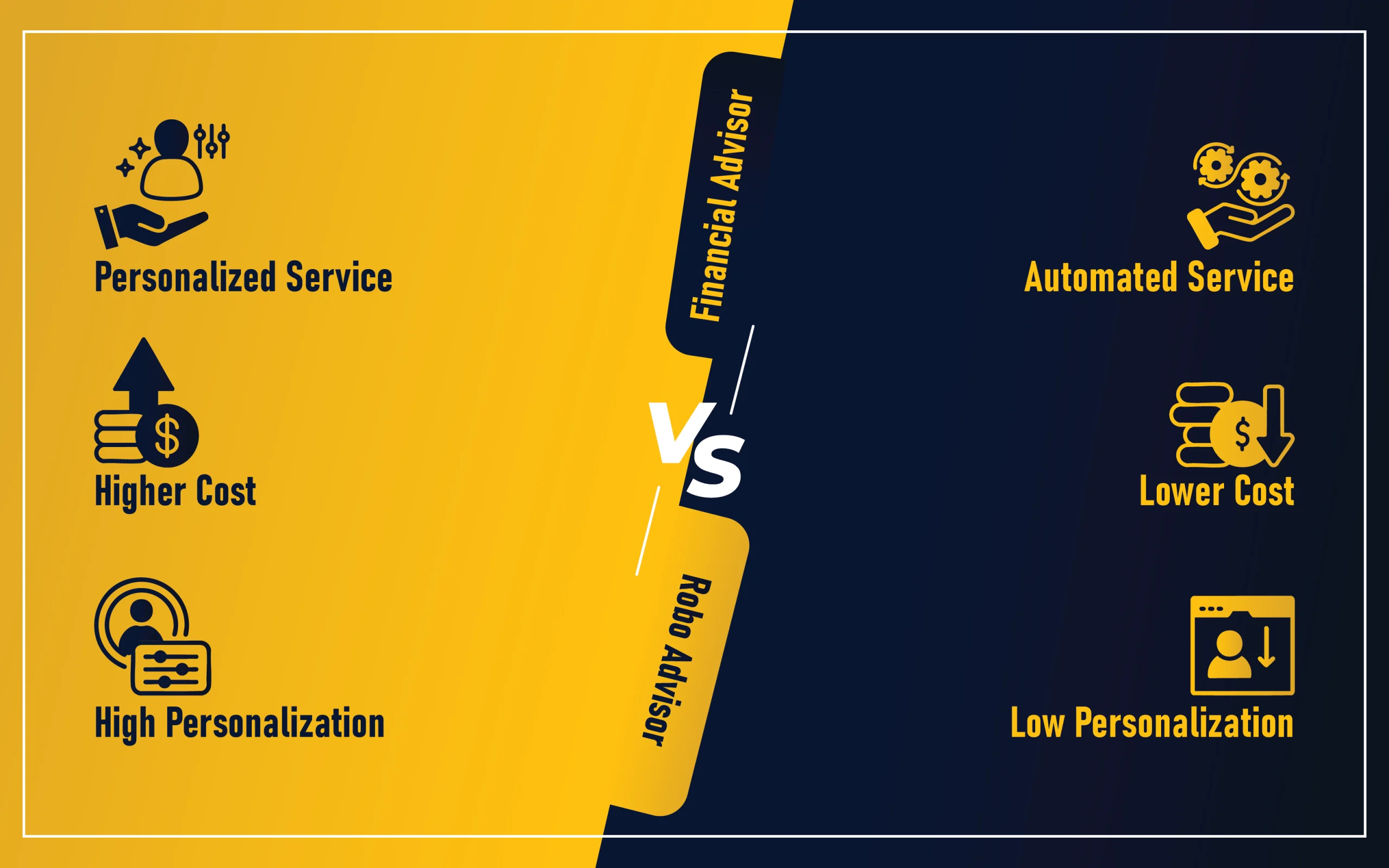Robo Advisor vs. Financial Advisor: Which One Should You Choose?

Choosing between a financial advisor and a robo advisor determines the direction of your entire investment journey. While the former offers algorithmic, automated advice, the latter provides human-influenced, tailored advice. This blog will make you conscious of their distinctions, pros, and cons, so you can simply choose the best fit for your financial needs.
Financial Advisors
Financial advisors are licensed professionals who provide personalized guidance to help individuals meet both short- and long-term financial goals. Unlike robo advisors, financial planners take a holistic approach—analyzing your full financial picture, including income, expenses, assets, liabilities, risk tolerance, and life goals.
They provide expert advice on areas such as investments, tax strategies, retirement planning, insurance, estate planning, and more. Whether you’re navigating complex financial decisions, facing major life events, or simply seeking a tailored financial roadmap, human advisors offer transparency, accountability, and strategic insight at every stage.
Key Points:
- Personalized, human-driven financial planning
- Comprehensive services: tax, retirement, insurance, estate, and investment advice
- Ideal for complex financial needs or emotional decision-making
- Offers tailored strategies with accountability and one-on-one support
- Typically higher fees but more holistic and adaptive advice
What Is a Robo Advisor?
 A robo advisor is an online service offering investment management using mostly automated systems with little or no human oversight. Using advanced algorithms, robo advisors examine your financial goals, risk tolerance, and time horizon to create and manage a portfolio of diversified investments.
A robo advisor is an online service offering investment management using mostly automated systems with little or no human oversight. Using advanced algorithms, robo advisors examine your financial goals, risk tolerance, and time horizon to create and manage a portfolio of diversified investments.
They are perfect for entry-level investors or cost-conscious individuals who want to invest in a passive way. Most robo advisors also offer automatic rebalancing and tax-loss harvesting as tools to optimize returns.
Key Points:
- Automated, algorithm-based investment platform
- Needs little human touch
- Low costs relative to human advisors
- Best suited for passive investors and novices
- Provides portfolio management, rebalancing, and tax optimization
What Is a Human Financial Advisor?

When it comes to investing, a human financial advisor is a regulated professional who provides individual financial planning advice toward personal needs, goals, and life situations. The human advisor differs from the robo advisor because of the emotional support and strategic guidance offered to clients.
The human advisor will give you flexibility in tweaking your program in the middle of big life transitions, such as marriage, purchasing a house, or retirement. They can also guide you in complicated financial decisions such as tax planning or estate planning, and they often develop long-term client relationships that help ensure your permanent financial success.
Key Points:
- Delivers personal, one-on-one financial guidance
- Assists with complicated and evolving life circumstances
- Offers emotional and behavioral guidance
- Ready for in-depth conversations and strategy sessions
- Tends to charge more than robo advisors
Financial Advisor vs. Robo Advisor: What Are the Differences

When choosing between a financial advisor and a robo advisor, it’s useful to understand how they are different when it comes to service, price, and personalization. Both are doing essentially the same thing—managing and growing your wealth—but they’re doing it in quite dissimilar fashion.
Robo advisors are online services powered by algorithms that build and rebalance your investment portfolios on their own according to your designations. They employ software-based techniques, which makes them very efficient and cost-effective. They are appropriate for investors with uncomplicated needs or novices.
Human financial planners, however, provide detailed, customized financial planning. They take into consideration your goals, emotional factors, and complexities in life. They’re particularly helpful for high-net-worth individuals or anyone confronted with major financial choices.
| Feature | Robo Advisor | Human Financial Advisor |
|---|---|---|
| Personalization | Algorithm-based; limited customization | Highly personalized advice and planning |
| Human Interaction | None or minimal (some offer hybrid models) | Full human interaction and relationship-building |
| Cost | Low fees (often 0.25 – 0.50% annually) | Higher fees (typically 1% of AUM or hourly rate) |
| Service Scope | Investment-focused | Comprehensive (includes estate, tax, retirement) |
| Minimum Investment | Low (as little as $100) | Often requires higher minimums |
| Accessibility | 24/7 via app or website | Scheduled appointments or calls |
| Emotional Guidance | NA | Available; helps with emotional decision-making |
Key Points:
- Robo advisors are best for low-cost, hands-off investing with basic goals.
- Financial advisors provide tailored, comprehensive guidance to address intricate financial requirements.
- Your choice depends on your goals, financial situation, and the level of support you require.
Pros and Cons of Using a Robo Advisor
| Pros | Cons |
| Low Fees: Typically charge 0.25%–0.50% of assets annually | Limited Personalization: Advice is based on algorithms, not nuance |
| Accessibility: Available 24/7 through apps or websites | No Human Touch: Lacks emotional guidance or face-to-face advice |
| Start with a minimum investment of just $100. | Narrow Scope: Primarily focused on investments only |
| Automated Portfolio Rebalancing: Keeps your investments on track | Not Ideal for Complex Needs: Can’t handle taxes, estate planning, etc. |
| Efficient & Fast: Instant account setup and quick portfolio updates | Limited Flexibility: Fixed investment models may not suit everyone |
Robo advisors are best suited for individuals looking for low-cost, automated investing with minimal complexity or human interaction.
Pros and Cons of Working with a Financial Advisor
| Pros | Cons |
| Personalized Advice: Tailors plans to your unique financial goals | Higher Fees: Typically charges around 1% of assets or hourly rates |
| Comprehensive Services: Covers taxes, estate planning, insurance, etc. | May Have High Minimums: Often requires substantial investable assets |
| Emotional Guidance: Helps avoid panic-driven decisions | Limited Availability: Requires appointments; not 24/7 |
| Goal-Oriented Planning: Helps with life events like retirement or buying a home | Advisor Quality Varies: Not all advisors offer the same expertise or fiduciary standards |
| Long-Term Relationship: Ongoing support and accountability | Advisors who earn commissions may exhibit biases related to their financial incentives. |
Coordinating with a financial advisor is best for people who have multifaceted financial requirements or who want to have a personal, relationship-driven style of wealth management.
Who’s the Right Financial Advisor for Your Situation?

The proper financial advisor is a function of your financial aspirations, the complexity of your needs, and personal temperament. If you’re new to investing, prefer to invest passively, or are on a tight budget, a robo advisor makes a great low-cost decision. Yet, if you require customized advice, assistance with life events, or enjoy interpersonal communication, a financial advisor is better for you.
Key Points:
- Choose a robo advisor if you prefer low fees, simple investing, and digital convenience.
- Choose a human advisor if you need holistic planning, emotional support, and custom strategies.
- Hybrid models offer a blend of both.
Conclusion
Choosing the right Financial advisor between a human advisor and a robo advisor depends on your comfort level, financial goals, and needs. Traditionally, there are those who will say that the best option for a beginner is a robo advisor and highly tech-savvy individual; somebody who just wants the lowest cost and easiest way to have portfolios managed automatically.
The human advisor will align more toward solving problems on a holistic basis for complicated life cases and long-term planning. Each has its strengths, and thus, being blended in some instances may present an excellent combination of the two.
Evaluate what’s complex for you financially, the level of involvement you wish to have, and your financial means to decide upon an advisor most suitable for your road toward financial prosperity.
FAQ’s
How do robo advisors compare to traditional financial advisors?
Robo advisors offer automated, low-cost, and efficient solutions for passive investors. Traditional financial advisors, while more expensive, deliver tailored advice, emotional support, and comprehensive financial planning for individuals with more nuanced or evolving needs.
